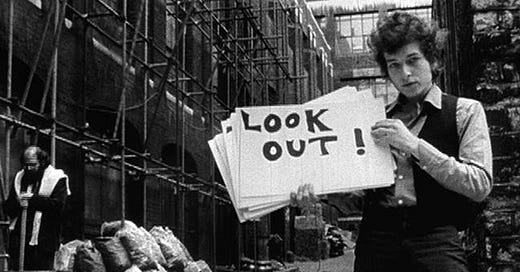Groundbreaking Rock Documentary
D.A. Pennebaker’s Don’t Look Back is frequently hailed as one of the greatest rock documentaries ever made, and it’s easy to see why Variety begged the question in a recent review of James Mangold’s A Complete Unknown.
Pennebaker, a pioneer of cinéma vérité, found in Bob Dylan circa 1965 an unparalleled subject—an artist on the cusp of a seismic shift (going electric) and traveling with a vibrant, chaotic entourage. Dylan, already hailed as the “spokesman of a generation,” was a cultural and artistic enigma. Who was this kid from Hibbing, Minnesota, channeling Woody Guthrie’s message and the music of Hank Williams, Jimmie Rodgers, and Robert Johnson? And how did he craft songs that elevated the standard for lyrical songwriting?
Don’t Look Back doesn’t answer these questions. Instead, it gives viewers a front-row seat to the chaos of the “starmaker machinery, behind the popular song.” What unfolds is a mesmerizing circus: Albert Grossman, Joan Baez, Donovan, and Allen Ginsberg whirl around Dylan in a haze of cigarette smoke, fragmented conversations, groupies, and raw emotion—all captured in shaky black-and-white footage, decades before gimbals smoothed out the art of handheld filmmaking.
At the heart of it all is Dylan himself, delivering a handful of transcendent performances, including spellbinding moments at Royal Albert Hall. His vocal delivery—sharp, evocative, and utterly unique—reminds us of the raw talent behind the myth, far removed from the caricatured vocal parodies that would follow in later years.
The Magic of the Music Documentary
The mere existence of Don’t Look Back is a revelation, much like the studio footage unearthed for Peter Jackson’s Get Back, a re-edit of Michael Lindsay-Hogg’s Let It Be. In both cases, the access to such iconic moments in musical history elevates the content, regardless of its technical composition. Within that context, it’s fair to say there’s no other rock documentary quite like Don’t Look Back. Any serious rock music fan has likely seen it and recognizes its importance because of the subject and the manner in which it’s presented.
The opening credits (frequently replayed) of Dylan disinterestedly flipping cue cards while “Subterranean Homesick Blues” plays in the background is frequently cited as the first MTV video. Regardless of the validity of that broad claim, few can deny capturing an artist like Dylan in his enigmatic and beguiling apex struck a vein of gold that would become a staple for years to come.
Hard to Beat the Beatles
As for whether it’s the best music documentary? That’s a more complicated question. The “rock music documentary” category is vast and loaded with exceptional entries, particularly in the longer-form format that has gained popularity in recent years. My vote for the best rock documentary would go to Peter Jackson’s Get Back, which uniquely captures the Beatles—the most influential band of all time—with unprecedented depth. For Beatles fans, it’s an extraordinary gift, as are The Complete Beatles (1982, now out of print) and The Beatles Anthology (1995), both offering different but equally compelling narratives.
Other Rock Docs
Bob Dylan’s story has also been revisited in Martin Scorsese’s No Direction Home (2005) and Rolling Thunder Revue (2019), both of which provide fresh perspectives on the artist at different points in his career. Elvis Presley, another towering figure, has yet to receive a definitive documentary, though Andrew Solt’s This Is Elvis (1981) comes closest, despite some awkward dramatizations.
Beyond these legends, there are several long-form rock documentaries worth mentioning:
History of the Eagles (2013): Allison Ellwood’s two-part, nearly four-hour TV documentary is packed with big hits, big egos, and unforgettable moments. A personal favorite.
Long Strange Trip (2017): Amir Bar-Lev’s sprawling Grateful Dead documentary for Amazon runs nearly four hours. While the horror-movie framing device falls flat, it’s a richly layered exploration of a band many struggle to understand.
Runnin’ Down a Dream (2007): Peter Bogdanovich’s look at Tom Petty’s career is a masterclass in storytelling, although we later learned about some omissions from Warren Zane’s excellent Petty biography.
Ultimately, the beauty of rock documentaries lies in their ability to illuminate an artist’s story, even when the film itself isn’t perfect. For fans, even a flawed documentary can be both informative and entertaining. Don’t Look Back might not offer the breadth of later works, but its raw, unfiltered look at Dylan during a pivotal moment ensures its place among the genre’s finest. Whether it’s the best is up for debate, but its influence is undeniable.
Don’t Look Back can be seen on MAX and The Criterion Channel




